Greg Palast's Blog, page 92
July 15, 2014
"Inside an Investigative Reporter" Greg Palast gives the full Monty
Download or listen to the full PRN broadcast.
Palast tells tales of undercover investigations, poetry, honey traps and why you stay the hell out of journalism school to Danny Schechter, the News Dissector.
* * * * * *
Greg Palast is the author of the New York Times bestsellers Billionaires & Ballot Bandits, The Best Democracy Money Can Buy and Armed Madhouse and the highly acclaimed Vultures’ Picnic.
Get Palast's latest film Vultures and Vote Rustlers.
HELP US FOLLOW THE MONEY. Visit the Palast Investigative Fund's store or simply make a tax-deductible contribution to keep our work alive!
Subscribe to Palast's Newsletter and podcasts.
Follow Palast on Facebook and Twitter.
June 28, 2014
Happy birthday, World War One!
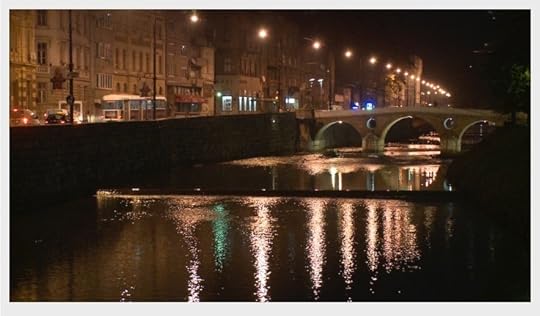 Greg Palast in Sarajevo, near where Archduke Franz Ferdinand was shot, tracing the trail of rogue financier 'Goldfinger.' (Photo: Richard Rowley for BBC-TV. The first ten readers to find Palast in the photo, will get a free copy of the film of this story, Vultures & Vote Rustlers.)
Greg Palast in Sarajevo, near where Archduke Franz Ferdinand was shot, tracing the trail of rogue financier 'Goldfinger.' (Photo: Richard Rowley for BBC-TV. The first ten readers to find Palast in the photo, will get a free copy of the film of this story, Vultures & Vote Rustlers.)
Happy birthday, World War One! Walking the mortar-cratered streets of Sarajevo, Bosnia, I was reminded that World War I started here, and World War II and World War III, World War V and VI and the current World War IX. Here in the city where the ghosts of Muslim, Catholic, Orthodox and Jewish victims outnumber the living, as I hunted another corpse-chewing financier, it became clear to me that the endless parade of war is not about a clash of civilizations, but the CASH of civilizations.
Before the Panzers rolled into Poland, they rolled into Krupp's profit projections. Before each of the seven invasions of Iraq, the oil reserves of Basra were tagged for the balance sheets of Anglo-Persian Corp ("BP"). And the atrocities and battles that bloated the balance sheets of J.P. Morgan led to the finance vultures I'm hunting from the Congo to Sarajevo; the last in the parade of the war profiteers, the clean-up crew, tasked to pull gold teeth from the wounded bodies of destroyed nations.
While earlier imperial wars promised booty for nations, World War I industrialized and privatized war profiteering. So long as conflict remains a profit center, war will never die. So happy birthday, World War Infinite, you're a hundred years young today.
* * * * * * *
While I am still working without a right diaphragm — thanks to the arrogance of "the best medical care in the world" — I am growing stronger, thinner and more cunning each day, preparing a report for Al Jazeera that will blow the lid off the latest, ugliest vote-theft scheme. And Thursdat, another birthday flew by at high speed. Don’t know how I feel about another year tossed into the dumpster of mortality. But as Hugo Chavez once sang to me (while wearing my fedora):
"Si arrastré por este mundo
la vergüenza de haber sido
y el dolor de ya no ser,
bajo el ala del sombrero
cuantas veces embozada
una lágrima asomada
yo no pude contener.
Si crucé por los caminos
como un paria que el destino
se empeñó en deshacer;
si fui flojo, si fui ciego,
solo quiero que comprendan
el valor que representa
el coraje de querer."
Claro.
- GP
* * * * * *
Greg Palast is the author of the New York Times bestsellers Billionaires & Ballot Bandits, The Best Democracy Money Can Buy and Armed Madhouse and the highly acclaimed Vultures’ Picnic.
Get Palast's latest film Vultures and Vote Rustlers.
HELP US FOLLOW THE MONEY. Visit the Palast Investigative Fund's store or simply make a tax-deductible contribution to keep our work alive!
Subscribe to Palast's Newsletter and podcasts.
Follow Palast on Facebook and Twitter.
May 24, 2014
Don't Leave Without Saying Good-ByeA personal note from Greg Palast
I wish my enemies to take note that my quadruple by-pass heart surgery three weeks ago was quite successful. My doctors say I can suit up for dragon-slaying in about six weeks. Bless you all for your thousands of healing notes and thoughts.
The day before going under the knife, I was reminded that, "You can't take it with you” – because the insurance company will take it first. (Bada-bing!) So, I invited my attorney to the cardiac unit (no kidding) to tweak my last will and testament – insuring that royalties to my books and films will continue to go the Palast Investigative Fund.
I truly wish you a long, happy and healthy life. But, alas, one day we all must shunt our mortal coils.
I am pleased to announce my new association with Al Jazeera for a series of in-depth globe-spanning investigative reports. It is a great honor to join with journalists whose inestimable courage I cannot hope to replicate, but whose high standards we will dignify with our best work.
Al Jazeera: “Journalism is not a crime.”
So, please, don't leave without saying goodbye. It's easy. Simply include the Palast Investigative Fund in your will. And contact us to let us know.
For those of you who seek more elaborate tax-savvy estate planning, our not-for-profit foundation has retained the services of an expert who can help guide you, please contact us.
But, if you're the impatient type, you can donate RIGHT NOW, and enjoy one of our special thank you gifts. Donate at least $50 dollars and get a signed copy of Billionaires & Ballot Bandits. Donate $1,000 and get a listing as a producer of the film, Billionaires & Ballot Bandits: The Movie.
You can also donate for any amount (no matter how large or small) or browse here for our many other gifts.
And, boy, can we use the help. Right now, our team is heading down to a state we can't name to dig into the latest in vote-theft shenanigans. A gaggle of secretaries of states, a bunch of Katherine Harris wannabes, have cooked up a devious scheme to knock out the votes of some 700,000 Asian-Americans. And it gets worse from there.
I am temporarily barred from pre-dawn stake-outs and hunts up the Congo River. But bad guys won't get a vacation: Zach, Nicole, Anthony, Lilly, Ms. Badpenny and the whole crew are taking up the sword while I recover and thank them.
And bless you all for keeping us clothed, fed and armed over the decade since our founding.
Live long and give'm hell,
- Greg Palast
* * * * * *
Greg Palast is also the author of the New York Times bestsellers Billionaires & Ballot Bandits, The Best Democracy Money Can Buy and Armed Madhouse and the highly acclaimed Vultures’ Picnic.
Get Palast's latest film Vultures and Vote Rustlers.
HELP US FOLLOW THE MONEY. Visit the Palast Investigative Fund's store or simply make a tax-deductible contribution to keep our work alive!
Subscribe to Palast's Newsletter and podcasts.
Follow Palast on Facebook and Twitter.
April 17, 2014
Lap Dancers, the CIA, Pay-offs, and BP’s Deepwater Horizon
By Greg Palast | for Truthdig
From his investigation for Channel 4 Television in the newly released film, Vultures and Vote Rustlers.
There was CIA involvement through a company called Mega Oil. They were shipping in arms under the cover of oil tools.
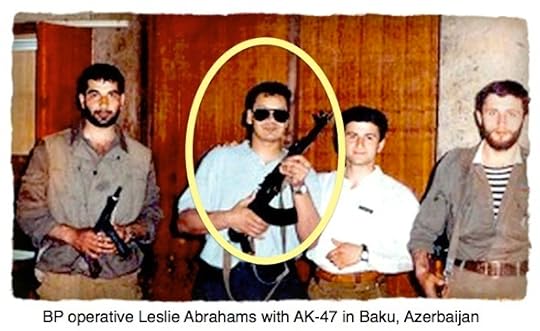
The BP executive was explaining to me how the CIA, MI6 and British Petroleum engineered a coup d'état, overthrowing an elected president of a nation who was “not favorable to BP.” The corporation's former Vice-President, Leslie Abrahams, is pictured here, holding an AK-47 in front of BP headquarters in Baku, Azerbaijan. Like most of the other BP executives I spoke with, he proudly added that while he was working for BP, he was also an operative for MI6, British intelligence.
The conversation was far from the weirdest I had in my four-continent investigation of the real story of the Deepwater Horizon.
The BP oilrig blew out on April 20, 2010, four years ago this Sunday.
Earlier this month, the Obama Administration officially OK'd BP's right to resume drilling in the Gulf of Mexico. And two weeks ago, just to assure the company that all is forgiven, the U.S. Department of the Interior gave BP a new contract to drill in the Gulf of Mexico–right next to where the Deepwater Horizon went down. At the same time, the forgive-and-forget U.S. Justice Department has put the trial of David Rainey, the only BP big-shot charged with a felony crime in the disaster, on indefinite hold.
The Deepwater Horizon blow-out incinerated eleven men on the rig and poisoned 600 miles of Gulf coastline. What political fairy dust does BP keep in its pocket to receive virtual immunity from the consequences?
To understand what really happened in the Gulf of Mexico, and how BP became a corporate creature beyond the reach of the law, British television network Channel 4 sent me on a four-continent investigation through a labyrinthine funhouse of bribery, lap-dancing, beatings, Wikileaks, a coup d'état, arrests and oil-state terror.
I found the cause of the tragedy of the Deepwater Horizon seven thousand miles from the Gulf in the ancient city of Baku, the Central Asian caravan stop on the Silk Road.
For the interview with agent Abrahams and the full story of the Deepwater Horizon, see, Vultures and Vote Rustlers, the documentary which will be available as a download without charge for the next two days courtesy of the not-for-profit Palast Investigative Fund.
The literal source of Soviet power until 1991, Baku has been exporting petroleum for 3,000 years. As the Soviet Union shattered into pieces that year, BP set its sights on the city. It is now the capital of the new nation of Azerbaijan, which sits atop the biggest untapped oil field in the world, right beneath the Caspian Sea.
A coup for BP
In 1992, then-BP Chairman Lord Browne flew into Baku as soon as the young state elected its first president, Abulfez Elchibey. Former British... READ THE FULL STORY AT TRUTHDIG
* * * * * *
Greg Palast is the author of Vultures’ Picnic, inside his investigations from the Arctic to the Congo, hunting down rogue billionaires. Palast’s reports are seen on BBC-TV and Britain’s Channel 4.
Watch Palast’s report BP in Deep Water on Free Speech TV, this Sunday at 7pm & 9pm ET. Check out the trailer here.
Greg Palast is also the author of the New York Times bestsellers Billionaires & Ballot Bandits, The Best Democracy Money Can Buy and Armed Madhouse.
HELP US FOLLOW THE MONEY. Visit the Palast Investigative Fund's store or simply make a tax-deductible contribution to keep our work alive!
Subscribe to Palast's Newsletter and podcasts.
Follow Palast on Facebook and Twitter.
April 2, 2014
Chavez, Maduro and Venezuela the story they don’t want you to read
By Greg Palast
Venezuelan president Nicholás Maduro wrote on Op Ed published in the New York Times yesterday calling for peace.
As someone who knows president Nicholás Maduro, Hugo Chavez' successor, (and Maduro's opponents), I can say that I’ve never met a head of state (and I’ve met many) who absolutely gives a real shit about the average working person of his nation.
Venezuela is Occupy Wall Street on its head: the 1% are out in the street, violently hoping to overthrow the government elected by working people. Are the Kochs involved?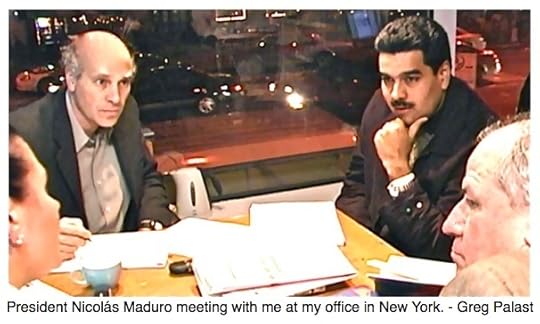
Why not read my reports on Venezuela?
● Did Chavez’ Pick Steal the Election in Venezuela?
● Hugo Chavez vs "The Network”
● The Koch Brothers, Hugo Chavez and the XL Pipeline
● Big Oil, Big Ketchup and The Assassination of Hugo Chavez
And once again, to shed light through the US media bullshit on Venezuela, my not-for-profit foundation is offering my film, "The Assassination of Hugo Chavez" as a FREE Download.
March 27, 2014
‘We’re All Some Kind of Native Now’
By Greg Palast | first printed in TruthDig as Death Came by Water First, Then Oil
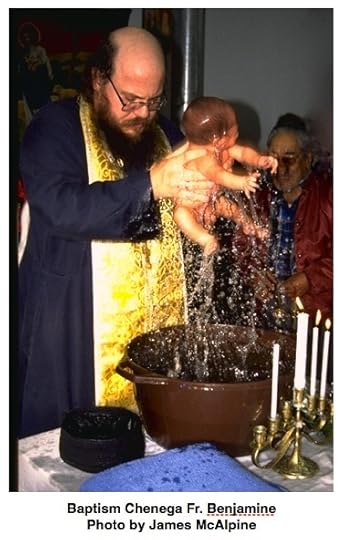 It was Good Friday, 50 years ago on March 27, 1964, that according to seismologists, the snow peaks of Prince William Sound jumped 33 feet into the air and fell back down. Emergency warnings about an earthquake-spurred tsunami went out to towns from Valdez, Alaska, to Malibu, Calif., but no one thought to send a message to the Chugach Natives in Chenega, Alaska.
It was Good Friday, 50 years ago on March 27, 1964, that according to seismologists, the snow peaks of Prince William Sound jumped 33 feet into the air and fell back down. Emergency warnings about an earthquake-spurred tsunami went out to towns from Valdez, Alaska, to Malibu, Calif., but no one thought to send a message to the Chugach Natives in Chenega, Alaska.
Chenega chief Nikolas Kompkoff watched the mountains leap and the waters around his island disappear over the horizon.
Knowing the water would return with a vengeance, he ran his four daughters up a hill toward high ground. But the nine-story-tall tsunami was moving too fast for their little legs. Kompkoff made a decision: He grabbed the two girls closest to him, tucked them under his arms and ran up the slope, leaving the other two to be seized by the wave.
Days later, a postal pilot on his weekly mail drop could not find Chenega because every single house – and a third of the residents – had been washed out to sea.
When he circled back to the site he saw the village’s church on the hill with survivors waving.
Kompkoff found the body of his youngest daughter stuck in the high branches of a pine tree. He buried her, then left to join the survivors, all refugees scattered throughout Alaska. The government told the village of seal hunters they could never return. No longer able to hunt, Kompkoff became an Orthodox priest – and a notorious drunk.
On Good Friday each year, Father Nikolas would return to his island with the remainder of his flock to place a cross among the broken sticks of the old village. Each year he swore they would rebuild.
The years passed, and the oath to rebuild seemed increasingly ludicrous. After a decade of helplessness, Father Nikolas put a gun under his chin and pulled the trigger. The bullet passed through his jaw. Embarrassed church bishops defrocked him in response.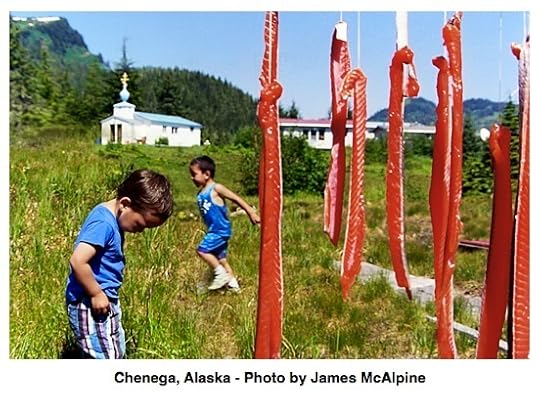 On Good Friday, 1989, the 25th anniversary of the earthquake, Kompkoff led his congregation (they still considered him “Father” Nick) in a commemoration of the tsunami’s dead at the church they built at New Chenega. The village had been resurrected stick by stick by Kompkoff’s nephew Larry Evanoff after Evanoff returned wounded from Vietnam.
On Good Friday, 1989, the 25th anniversary of the earthquake, Kompkoff led his congregation (they still considered him “Father” Nick) in a commemoration of the tsunami’s dead at the church they built at New Chenega. The village had been resurrected stick by stick by Kompkoff’s nephew Larry Evanoff after Evanoff returned wounded from Vietnam.
What the celebrants did not know was that that very night another tsunami would head toward them, a wave of oil from the Exxon Valdez.
As the oil slick spread from the grounded tanker through Chugach waters, Exxon made the Old Chenega area what the industry calls a “sacrifice zone.” The company’s executives allowed it to be slathered by tons of crude.
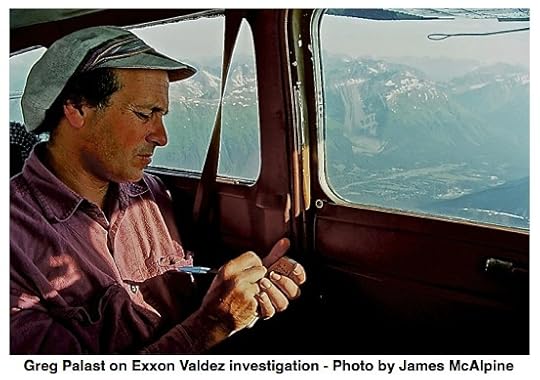 Weeks after the spill, the president of Exxon stopped by New Chenega for a “we care” television photo-op. Village patriarch Paul Kompkoff, Nikolas’ brother, asked him, “Are my parents’ bones covered with oil?”
Weeks after the spill, the president of Exxon stopped by New Chenega for a “we care” television photo-op. Village patriarch Paul Kompkoff, Nikolas’ brother, asked him, “Are my parents’ bones covered with oil?”
The official answer was that the bones were undisturbed. In fact, as I reported in my book, Vultures' Picnic, both the oil and bones were being scooped up by Exxon bulldozers at that very moment.
The Chugach hired me to investigate the spill's true cause and true culprits. Paul Kompkoff asked me to arrange a secret meeting with Exxon in hopes of getting a few dollars so the new village could survive. In particular, the Chenegans wanted Exxon to hire them to clean up the beaches and fishing grounds still contaminated with Exxon’s gunk.
 With Chenega leader Gail Evanoff, Kompkoff and I flew from Alaska to San Diego to corner Exxon USA General Manager Otto Harrison. It was now three years after the spill and still no money had been forthcoming. The Exxon honcho, an enormous Texan, took us to a corporate meeting room, and from across the giant conference table looked down at the diminutive Evanoff and said, “Now, Gail, ah cayn’t be payin’ a bunch o’ Natives to go ’round picking up oil that ain’t there, can I?”
With Chenega leader Gail Evanoff, Kompkoff and I flew from Alaska to San Diego to corner Exxon USA General Manager Otto Harrison. It was now three years after the spill and still no money had been forthcoming. The Exxon honcho, an enormous Texan, took us to a corporate meeting room, and from across the giant conference table looked down at the diminutive Evanoff and said, “Now, Gail, ah cayn’t be payin’ a bunch o’ Natives to go ’round picking up oil that ain’t there, can I?”
In 2010, I returned to Prince William Sound for British television. On the Chugach’s islands, I picked up gobs of the “oil that ain’t there” in my (carefully gloved) hand. It was more than two decades after the Exxon Valdez spill.
Then I flew down to the Gulf of Mexico where I collected giant hunks of Deepwater Horizon oil nearly a year after the spill – more "oil that ain't there," at least according to our government and BP television ads.
*
In 2011, 22 years after the Alaska spill, Exxon paid for the damage – but only after the Supreme Court cut the payout by 90 percent. Part of Chenega’s money was meant for a new fishing boat for Paul Kompkoff. But he was long dead by then, as were a third of my Native clients..
*
I was in Chenega on the second anniversary of the Exxon spill. Paul Kompkoff and I snacked on dried salmon while we watched the first Gulf War on CNN. The U.S. Air Force was bombing the bejesus out of Baghdad.
The old man watched a long while in silence. Then said, in his slow, quiet voice, "I guess we're all some kind of Native now."
* * * * * *
The story of Greg Palast’s investigation of the Exxon Valdez, Deepwater Horizon and other tales of corporate carnivores is found in his book, Vultures’ Picnic. His investigations, from Alaska to the Amazon, are contained in his new film, Vultures and Vote Rustlers.
Greg Palast is also the author of the New York Times bestsellers Billionaires & Ballot Bandits, The Best Democracy Money Can Buy and Armed Madhouse.
HELP US FOLLOW THE MONEY. Visit the Palast Investigative Fund's store or simply make a tax-deductible contribution to keep our work alive!
Subscribe to Palast's Newsletter and podcasts.
Follow Palast on Facebook and Twitter.
March 24, 2014
BP, not Exxon, caused the Exxon Valdez disaster
By Greg Palast | Read the full story at TruthDig
Two decades ago I was the investigator for the legal team that sold you the bullshit that a drunken captain was the principal cause of the Exxon Valdez disaster, the oil tanker crackup that poisoned over a thousand miles of Alaska's coastline 25 years ago today, on March 24, 1989. The truth is far uglier, and the real culprit—British Petroleum, now BP—got away without a scratch to its reputation or to its pocketbook.
The truth is far uglier, and the real culprit—British Petroleum, now BP—got away without a scratch to its reputation or to its pocketbook.
Just this month, the Obama administration authorized BP to return to drilling in the Gulf.
It would be worth the time of our ever-trusting regulators to take a look at my Exxon Valdez files on BP. They would see a decades-long pattern of BP's lies, bribes and cover-ups that led, inexorably, to the Deepwater Horizon blowout—and that continue today within BP's worldwide oil operations.
Here's a sample:
Palast's investigation of BP opens his latest film, “Vultures and Vote Rustlers.” Pre-release editions are available on DVD and download for a donation to Palast's foundation for investigative reporting.
And read the complete untold story of the Exxon Valdez and Deepwater Horizon disasters in Palast's “Vultures' Picnic,” BBC Newsnight's Culture Program's Book of the Year.
Fraud No. 1: The Emergency Sucker Boat fraud
As the principal owner of the Alaska Pipeline and Terminal, BP, not Exxon, was designated by law to prevent oil spilled by the Exxon Valdez from hitting the beach. It was BP's disastrous failures, more than Exxon's, that allowed the oil to devastate Alaska's coast.
Containing an oil spill—preventing spilled crude from spreading to the shore—is not rocket science. All you need are rubbers and suckers. It works like this:
If a tanker, oil rig or pipe bursts open, you surround it with a giant rubber skirt known as “boom.” Then you suck the oil out through vacuum hoses on board special “containment” or “skimmer” ships.
The containment ship is the firetruck of oil spills. You simply don't let tankers out of port unless a containment ship is ready to roll. It's against the law.
But the law has never meant much to BP.
In May 1977, as the first tankers left Valdez, BP executives promised the state of Alaska that no tanker would leave port unless there were two containment barges at the ready and loaded with boom, with one placed near Bligh Island.
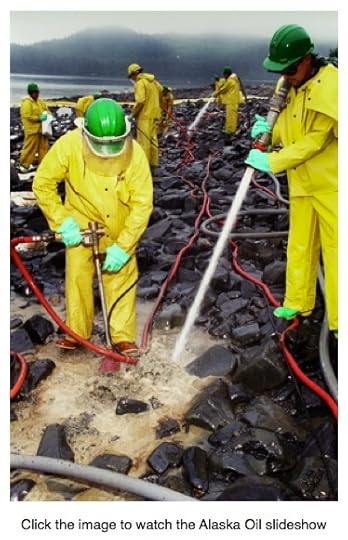 In fact, on March 24, 1989, when the Exxon Valdez ran aground, right at Bligh Island, the containment barge was far away in Valdez, locked in a dry dock, its boom and hoses under Alaskan ice. As a result, by the time the emergency oil spill vessel got to the stricken ship, the oil slick was a hundred miles in circumference and beyond control.
In fact, on March 24, 1989, when the Exxon Valdez ran aground, right at Bligh Island, the containment barge was far away in Valdez, locked in a dry dock, its boom and hoses under Alaskan ice. As a result, by the time the emergency oil spill vessel got to the stricken ship, the oil slick was a hundred miles in circumference and beyond control.
Two decades later, I watched fireboats uselessly spraying the burning oil on the Deepwater Horizon. Once again there were no BP skimmer barges, no boom surrounding the rig. Just as in Alaska, the promised spill containment operation was a con.
Fraud No. 2: Ghost Crews
There's no sense having a fire truck without firemen. And so, years before the Exxon Valdez grounding, Alyeska, the oil company consortium headed by BP, promised the U.S. Department of the Interior and the U.S. Congress, under oath, that the oil shipper would employ a trained and equipped crew around the clock to jump from helicopters, if needed, to contain an oil spill. My clients, the Chugach Natives of Alaska, agreed to give up ownership of the land under the Port of Valdez to the oil companies in return for those jobs.
The night the Exxon Valdez grounded, Chugach Natives watched from the beach at nearby Tatitlek Village as the tanker headed into the reef. They could have prevented the disaster—but they were helpless: BP had fired them.
To save money, BP's Alyeska simply drew up lists of nonexistent emergency spill response workers: an imaginary crew to man phantom emergency ships.
Fraud No. 3: Phantom Equipment
And the rubber boom? That was a phantom as well. BP's Alyeska had promised that too, in writing. The equipment was supposed to be placed along the tanker route including Bligh Island—exactly the spot where the Exxon Valdez grounded.
And so, it was no surprise to me that 21 years later in the Gulf there were neither skimmers nor boom at the site of the Deepwater Horizon.
Cover-Up and Threats
Did BP's top executives and partners know of the ghost response teams and phantom equipment ruse? Yes, we have the documents and insiders' testimony. Just two examples from my bulging file cabinet:
In a confidential letter dated April 19, 1984, Capt. James Woodle, BP's commander of the port at Valdez, warned that “due to a reduction in manning, age of equipment, limited training and lack of personnel, serious doubt exists that [we] would be able to contain and clean up effectively a medium or large size oil spill.”
In response, BP threatened the captain with a file on his marital infidelities (fabricated), fired him, then forced him to destroy his files. (I've got the letter—can't tell you how. Click here.)
In September 1984, before the Exxon Valdez disaster, BP's shipping broker, Charles Hamel, was so concerned at what he saw as an immediate danger in Alaska that he flew by Concorde to London to warn BP's chiefs of the looming emergency. In response, BP hired ex-CIA operatives to tap Hamel's phone and intercept his mail. BP's black ops team even ran a toy truck with a microphone into the air vents of a building where he was speaking with a congressman. (Ultimately, BP's spooks were captured by a team of Navy SEALs.)
BP Gets Off Cheap
The team of attorneys representing the Natives and fishermen whose lives were destroyed by the tanker spill chose to hold back the true and ugly story of systematic fraud and penny-pinching negligence by BP and its partners. We focused instead on the simpler story of human frailty and error—“drunken skipper hits reef.”
We didn't have a choice: Oil company chiefs had told our clients—Natives who were out of cash, isolated and desperate—that they wouldn't get a dime unless we agreed not to use the “f-word”: fraud.
And BP? Who said crime doesn't pay? BP walked away with a nominal payment to Alaska's Natives, fishermen and towns of $125 million—100 percent of it covered by insurance.
The Oil is Still There
In 2010 for the U.K.'s Channel 4 Television, I returned to Alaska with filmmaker Richard Rowley. In the quiet rivulets of the islands within Prince William Sound, we kicked over some stones—and the place, two decades after the spill, smelled like a filthy gas station.
Maybe it's time for the Obama Administration, eager to welcome BP back to plunder the Gulf, to wake up and smell the crude.
* * * * * *
Greg Palast investigated fraud charges against Exxon and BP in the grounding of the Exxon Valdez for the Chugach Natives of Alaska, owners of the shoreline. He has continued to investigate BP and the oil industry for BBC TV and Channel 4 (UK) and The Guardian, expanded in his book, Vultures’ Picnic and the newly released film, Vultures and Vote Rustlers, available only from Palast’s not-for-profit foundation for investigative reporting.
Greg Palast is also the author of the New York Times bestsellers Billionaires & Ballot Bandits, The Best Democracy Money Can Buy and Armed Madhouse.
HELP US FOLLOW THE MONEY. Visit the Palast Investigative Fund's store or simply make a tax-deductible contribution to keep our work alive!
Subscribe to Palast's Newsletter and podcasts.
Follow Palast on Facebook and Twitter.
March 15, 2014
Give me 95 seconds
This is the best 95 seconds you can have with your clothes on. Watch this now! And pass it on:
Now, get yourself a copy of this film, Vultures and Vote Rustlers — an hour-long real-life detective story. Get the DVD – signed.
For a $40 donation, I’ll sign and send you the DVD Vultures and Vote Rustlers — and you’ll get another hour an a half of me and Amy Goodman, me and Eskimo leader Etok and his whale (and whale meat) and more.
- Or download it now ($20 minimum donation).
It’s a one hour chase scene – hunting the bad guys from the Congo to Bosnia to darkest Brooklyn. Inside the secret files of the State Department, MI6, BP, Chevron, Larry Summers (!), the WTO, the IMF, the Koch Brothers (no kidding) and more.
You liked Billionaires & Ballot Bandits? Vultures’ Picnic? Best Democracy Money Can Buy? Here are the films of the reports in those bestsellers.
Then get one of these film and book combos.
-The Vultures Combo: Vultures & Vote Rustlers, the film PLUS Vultures’ Picnic, hardbound, both signed, for a minimum donation of $80.
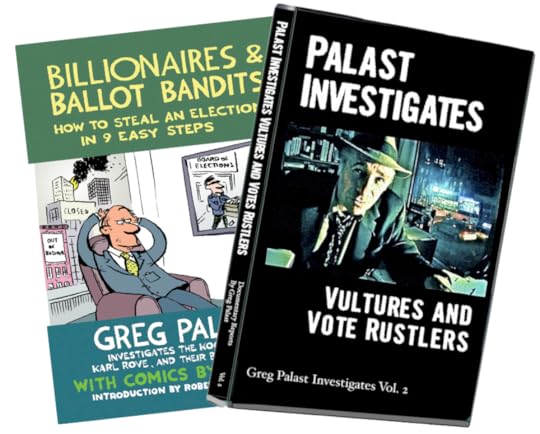 - Or Vultures & Vote Rustlers DVD and my book Billionaires & Ballot Bandits for a minimum donation of $70.
- Or Vultures & Vote Rustlers DVD and my book Billionaires & Ballot Bandits for a minimum donation of $70.
 Or get the Double Trouble deal: Donate at least $70 and I’ll send you TWO Vultures & Vote Rustlers DVDs, one signed to you — plus another to give to your dumb brother-in-law who calls you a conspiracy nut. (Give me a name, and I’ll personalize it to your frenemy — or loved one.)
Or get the Double Trouble deal: Donate at least $70 and I’ll send you TWO Vultures & Vote Rustlers DVDs, one signed to you — plus another to give to your dumb brother-in-law who calls you a conspiracy nut. (Give me a name, and I’ll personalize it to your frenemy — or loved one.)
And please, please: if you are thinking of deserving charitable groups consider the Palast Investigative Fund, a 501c3 foundation project, will make lots of trouble for your tax-deductible donation.
Truly, we appreciate your support — and please pass the word — and the information.

* * * * * *
Greg Palast’s new film, “Vultures and Vote Rustlers,” is based on his reports for BBC Television and Democracy Now.
Greg Palast is the author of the New York Times bestsellers Billionaires & Ballot Bandits,The Best Democracy Money Can Buy, Armed Madhouse and the highly acclaimed Vultures' Picnic.
HELP US FOLLOW THE MONEY. Visit the Palast Investigative Fund's store or simply make a tax-deductible contribution to keep our work alive!
Subscribe to Palast's Newsletter and podcasts.
Follow Palast on Facebook and Twitter.
March 10, 2014
Fukushima: They Knew
Tomorrow marks the 3rd Anniversary
of the Fukushima Nuclear disaster.
By Greg Palast for FreePress.org
"Completely and Utterly Fail in an Earthquake"
The Fukushima story you didn't hear on CNN
I've seen a lot of sick stuff in my career, but this was sick on a new level.
Here was the handwritten log kept by a senior engineer at the nuclear power plant:
 Wiesel was very upset. He seemed very nervous. Very agitated. . . . In fact, the plant was riddled with problems that, no way on earth, could stand an earth- quake. The team of engineers sent in to inspect found that most of these components could "completely and utterly fail" during an earthquake.
Wiesel was very upset. He seemed very nervous. Very agitated. . . . In fact, the plant was riddled with problems that, no way on earth, could stand an earth- quake. The team of engineers sent in to inspect found that most of these components could "completely and utterly fail" during an earthquake.
"Utterly fail during an earthquake." And here in Japan was the quake and here is the utter failure.
The warning was in what the investigations team called The Notebook, which I'm not supposed to have. Good thing I've kept a copy anyway, because the file cabinets went down with my office building ....
WORLD TRADE CENTER TOWER 1, FIFTY-SECOND FLOOR
NEW YORK, 1986
[This is an excerpt in FreePress.org from Vultures' Picnic: In Pursuit of Petroleum Pigs, Power Pirates and High-Finance Fraudsters, to be released this Monday. Click here to get the videos and the book.]
Two senior nuclear plant engineers were spilling out their souls and files on our huge conference table, blowing away my government investigations team with the inside stuff about the construction of the Shoreham, New York, power station.
The meeting was secret. Very secret. Their courage could destroy their careers: No engineering firm wants to hire a snitch, even one who has saved thousands of lives. They could lose their jobs; they could lose everything. They did. That’s what happens. Have a nice day.
On March 12 this year, as I watched Fukushima melt, I knew: the "SQ" had been faked. Anderson Cooper said it would all be OK. He'd flown to Japan, to suck up the radiation and official company bullshit. The horror show was not the fault of Tokyo Electric, he said, because the plant was built to withstand only an 8.0 earthquake on the Richter scale, and this was 9.0. Anderson must have been in the gym when they handed out the facts. The 9.0 shake was in the middle of the Pacific Ocean, 90 miles away. It was barely a tenth of that power at Fukushima.
I was ready to vomit. Because I knew who had designed the plant, who had built it and whom Tokyo Electric Power was having rebuild it: Shaw Construction. The latest alias of Stone & Webster, the designated builder for every one of the four new nuclear plants that the Obama Administration has approved for billions in federal studies.
But I had The Notebook, the diaries of the earthquake inspector for the company. I'd squirreled it out sometime before the Trade Center went down. I shouldn't have done that. Too bad.
All field engineers keep a diary. Gordon Dick, a supervisor, wasn’t sup- posed to show his to us. I asked him to show it to us and, reluctantly, he directed me to these notes about the “SQ” tests.
 SQ is nuclear-speak for “Seismic Qualification.” A seismically qualified nuclear plant won’t melt down if you shake it. A “seismic event” can be an earthquake or a Christmas present from Al Qaeda. You can’t run a nuclear reactor in the USA or Europe or Japan without certified SQ.
SQ is nuclear-speak for “Seismic Qualification.” A seismically qualified nuclear plant won’t melt down if you shake it. A “seismic event” can be an earthquake or a Christmas present from Al Qaeda. You can’t run a nuclear reactor in the USA or Europe or Japan without certified SQ.
This much is clear from his notebook: This nuclear plant will melt down in an earthquake. The plant dismally failed to meet the Seismic I (shaking) standards required by U.S. and international rules.
Here’s what we learned: Dick’s subordinate at the nuclear plant, Robert Wiesel, conducted the standard seismic review. Wiesel flunked his company. No good. Dick then ordered Wiesel to change his report to the Nuclear Regulatory Commission, change it from failed to passed. Dick didn’t want to make Wiesel do it, but Dick was under the gun himself, acting on direct command from corporate chiefs. From The Notebook:
Wiesel was very upset. He seemed very nervous. Very agitated. [He said,] “I believe these are bad results and I believe it’s reportable,” and then he took the volume of federal regulations from the shelf and went to section 50.55(e), which describes reportable deficiencies at a nuclear plant and [they] read the section together, with Wiesel pointing to the appropriate paragraphs that federal law clearly required [them and the company] to report the Category II, Seismic I deficiencies.
Wiesel then expressed his concern that he was afraid that if he [Wiesel] reported the deficiencies, he would be fired, but that if he didn’t report the deficiencies, he would be breaking a federal law. . . .
The law is clear. It is a crime not to report a safety failure. I could imagine Wiesel standing there with that big, thick rule book in his hands, The Law. It must have been heavy. So was his paycheck. He weighed the choices: Break the law, possibly a jail-time crime, or keep his job.
What did Wiesel do? What would you do?
Why the hell would his company make this man walk the line? Why did they put the gun to his head, to make him conceal mortal danger? It was the money. It’s always the money. Fixing the seismic problem would have cost the plant’s owner half a billion dollars easy. A guy from corporate told Dick, “Bob is a good man. He’ll do what’s right. Don’t worry about Bob.”
That is, they thought Bob would save his job and career rather than rat out the company to the feds.
But I think we should all worry about Bob. The company he worked for, Stone & Webster Engineering, built or designed about a third of the nuclear plants in the United States.
From the fifty-second floor we could look at the Statue of Liberty. She didn’t look back.
***
Greg Palast is the author of Vultures' Picnic : In Pursuit of Petroleum Pigs, Power Pirates and High-Finance Carnivores.
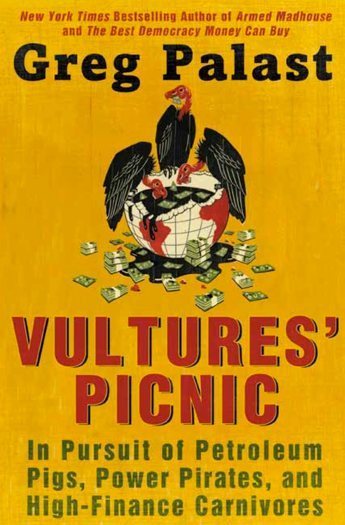 Get it now!
Get it now!
For more information about Palast's brand new book and his book-signing events in your city click here
Download Chapter 1 of the book: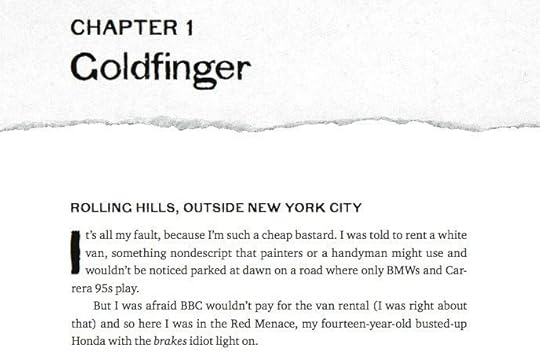
Subscribe to Palast's Newsletter and podcasts.
Follow Palast on Facebook and Twitter.
Judge calls Chevron vs Ecuador Case "Egregious Fraud"
By Greg Palast
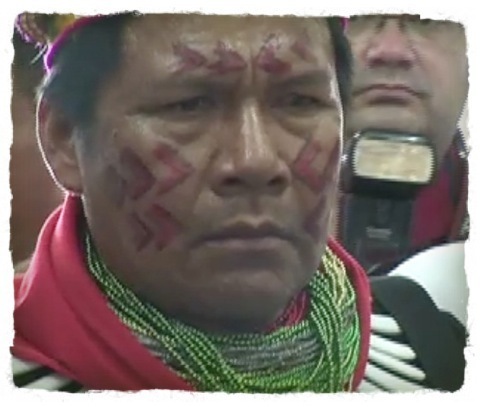 A federal judge in New York today slapped a stern order on attorney Steven Donziger and the Ecuadorean villagers he claims to represent, prohibiting them from capitalizing on a $9 billion judgment the judge said was the product of “egregious fraud.”
A federal judge in New York today slapped a stern order on attorney Steven Donziger and the Ecuadorean villagers he claims to represent, prohibiting them from capitalizing on a $9 billion judgment the judge said was the product of “egregious fraud.”
The judge is completely, utterly full of shit, here's the real story.
Chevron Runs from Judgment in Ecuador
Also watch Palast's report from the Amazon for BBC , War Paint and Lawyers: Rainforest Indians versus Big Oil on the DVD Palast Investigates: From 8-Mile to the Amazon. Get the signed DVD or Download it for FREE.
********
Greg Palast's investigation of Chevron's oil drilling operations in the Amazon for BBC Television Newsnight is included in the DVD compendium Palast Investigates. Get a signed DVD or download the film for FREE.
Palast's investigations are supported in part by the Puffin and Cloud Mountain Foundations and the Palast Investigative Fund, a 501c3 charitable trust.
Subscribe to Palast's Newsletter and podcasts.
Follow Palast on Facebook and Twitter.
Greg Palast's Blog
- Greg Palast's profile
- 138 followers



